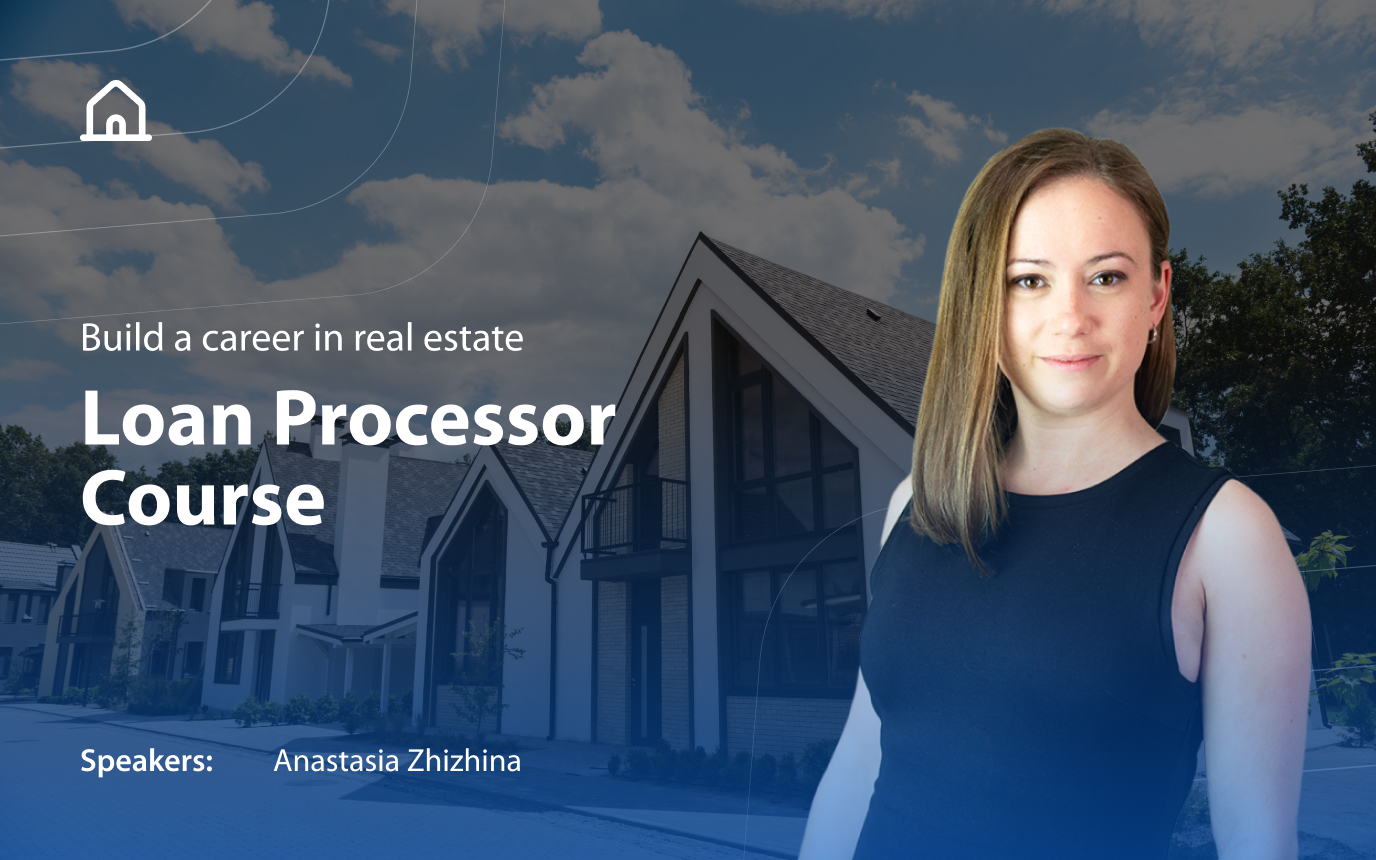

Loan Processor Course
Build a career in real estate
Description
Welcome to the Loan Processor course! Whether you’re new to the mortgage industry or seeking to enhance your skills, this course is designed to provide you with the knowledge and tools necessary to excel as a loan processor.
Throughout the course, you’ll gain a comprehensive understanding of the loan processing journey, from application to closing. We’ll cover essential topics such as loan documentation requirements, credit analysis, income verification, and compliance regulations.
By the end of the course, you’ll be equipped with the skills and confidence to efficiently navigate the loan processing landscape, ensuring that loans are processed accurately, efficiently, and in compliance with regulatory standards.
Key Learning Objectives:
- Understanding the loan processing lifecycle
- Reviewing and analyzing loan applications
- Verifying borrower information and documentation
- Assessing creditworthiness and risk
- Navigating compliance requirements and regulations
- Streamlining workflows and managing timelines
Who is this course for:
- Individuals who aspire to become Loan Processors
- Current Loan Processors seeking to level up their skills and knowledge
- Mortgage professionals looking to gain a deeper understanding of the loan processing
- Anyone interested in pursuing a career in mortgage lending or real estate finance
Join us on this educational journey as we empower you with the expertise and insights needed to thrive in the dynamic world of loan processing.
Advantages
Professional Growth
Enhance your skills and knowledge in loan processing, opening up opportunities for career advancement and development within the mortgage industry.
Practical Skills
Learn how to efficiently review loan applications, verify borrower information, and assess creditworthiness, equipping you with the tools to excel in your role as a loan processor.
Industry Relevance
Stay up-to-date with the latest trends and regulations in mortgage lending, ensuring that you are well-equipped to navigate the dynamic landscape of loan processing.
Professional support
You will get personalized support, guidance, and resources that match your unique needs, goals, and circumstances. The LBC Academy team can answer any questions.
Course content
90 lectures - 8 hours 20 minutes
Module 1 - Introduction
6 lectures - 26 minutesMilestones: process from start to closing
8:24Key people and their roles in the process
7:29Transaction types
4:21Property types and what makes them different
2:08Program types and what makes them different
2:00Occupancy types and what makes them different
1:28
Calyx point
6 lectures - 2 hours1003 – how to complete and where to get the information
53:30Disclosures overview
26:10Fee Sheet and LE – fee estimation and how to complete
14:47DU – what is it and how to run it
11:20LP – what is it and how to run it
7:48Ink-it and E-Loan File
6:12
Credit
7 lectures - 30 minutesAuthorization – what is it and where to get it
2:52How to run credit
3:56How to review credit
6:03How to help client to improve credit (simulator and rapid re-score)
5;04When and how to reissue credit
4:13Credit supplement – what is it and why it is needed
3:11Omitted liability – what is it and how to do it
3:57
Income
8 lectures - 1 hour 27 minutesFull doc loan – how to calculate W2 income (16:20)
16:20Full doc loan – how to calculate self-employed income
11:32Full doc loan – additional income sources
19:02Full doc loan – W2 and self-employment income combined
2:50Non-QM – bank statement calculations
29:38Non-QM – DSCR – how to evaluate and analyze
2:17Non-QM – Profit and Loss statement calculations
3:58Non-QM – what is needed from CPA
1:47
Assets
6 lectures - 25 minutesWhat assets are acceptable
2:50In what form assets are presented
4:26How to review asset statements
7:02What is sourcing and why is it needed
3:35Gift
2:24What seasoning means and what is the term
0:43
Escrow and Title
8 lectures - 42 minutesWhat is escrow and why is it present in transaction
00:47What is EMD, why is it needed and what is important to keep in mind
00:43Purchase – contingency period – what is it and why it is important (FL vs CA)
4:42What is title and why is it present in transaction
00:43How and when to open escrow and title and who is responsible for the task
1:07Escrow documents – how to read settlement statement
17:21Title – how to read preliminary title report
7:42What documents are needed from escrow and title
9;40
Pre-approval
3 lectures - 12 minutesWhat it means to pre-approve the file
00:40Why is it needed
00:39How to complete pre-approval letter and who can issue it
1:44
Submitting file to a lender
6 lectures - 1 hourWhat goes into a submission package
6:50Lender specific forms – how do you know what is needed and where to find it
4:07Submission examples
34:46Lender’s disclosures – importance and timing
3:37Stages the file goes through on the lender’s side
6:31What to request while file is in review
5:45
Approval
18 lectures - 1 hour 8 minutesWhat it means
00:28How to review approval
10:52Standard conditions
4:37Appraisal – what is it, types of appraisals in accordance with property and occupancy type
5:28Appraisal – PIW – what is it, how do you know if you got it and what to do
1:03Appraisal – when and how to order it
1:40Appraisal order examples
9:22How to review appraisal
7:28What if appraisal comes higher or lower
1:52When and why two appraisals are needed
1:03Insurance – why is it needed
00:27Insurance types
2:30Insurance – what is needed and how to get it
1:40HOA – what is it
1:34HOA Cert – why is it needed
1:06HOA Cert – how to order (example)
11:17HOA Cert – how to review
4:06LOE – what is it and templates for most common cases
1:21Note to u/w – when, how and why
1:00
Rate
5 lectures - 5 minutesWhat it means to lock the rate and why it is important
1:04Keeping track of rate lock
00:33Alert to lock – what it means and what to do
00:40Rate lock extension
00:42What are impounds?
2:30
Steps the file goes through after the approval
6 lectures - 8 minutesRe-disclosures – when and why
00:40CD – what is it and importance of timing
00:30QA – what it means
1:27CTC – what it means
00:30PTF – what is it and what needs to be done
2:26Loan Documents – overview and process of signing
1:36Funding process – processor’s role
1:15
Mortgage Insurance
2 lectures - 2 minutesWhat is it
00:30When is it needed and why
00:47
Communication throughout the process
7 lectures - 8 minutesHow and when to update your LO
1:07When and why to involve the LO
1:00Follow ups (with lender, LO, client and etc)
1:00When and why to involve AE
00:50Communication with AM
1:06Communication with AMC
00:52Communication with underwriters
1:19
Closing
1 lecture - 2 minutesPost-closing conditions – what is it and how to handle it
2:10
Speaker

Anastasia Zhizhina
Processing Department Manager
Ana Zhizhina, a highly experienced and dedicated Senior Processor at LBC Mortgage.
Since joining the company in 2016 as a Jr Processor, Ana has successfully closed numerous deals, demonstrating her exceptional skills and expertise in the mortgage industry. With her extensive knowledge and firsthand experience, Ana is a valuable resource to her colleagues and clients.

30-Day Money-Back Guarantee
Don't miss an opportunity to expand your knowledge and acquire new skills by learning from the leaders in the industry! Keep up with modern real estate trends to stay ahead of the market.
Recognition
Invest in your future
and enroll today!
Don't miss an opportunity to expand your knowledge and acquire new skills by learning from the leaders in the industry! Keep up with modern real estate trends to stay ahead of the market and make smart decisions!
- Trusted company
- Money-back guarantee
Сan't choose a course?
Book a free consultation
